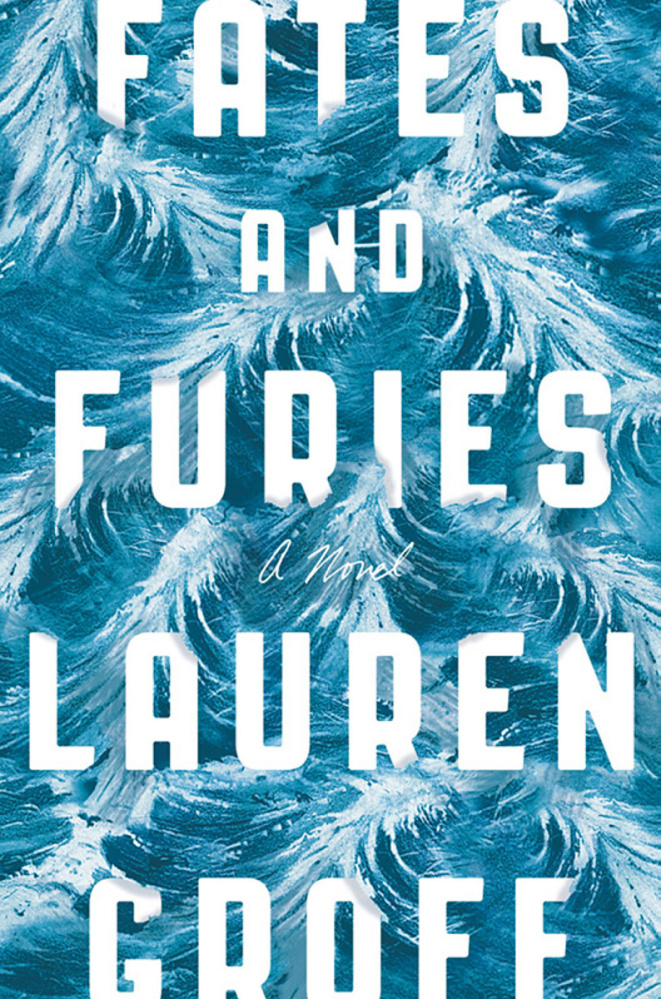A strange thing happens when Lauren Groff’s male readers talk to her about her latest novel, “Fates and Furies”: They want to tell her how lousy men are.
“Even really sensitive guys sort of look me dead in the face and say, ‘You’re right. Men really are terrible people’ – which is not something I believe!” says Groff. She’s not targeting men, she explains: “I’m writing about privilege. It’s a terrible thing when you’re not aware of what it is and what it does.”
Still, readers might be forgiven for their assumptions. “Fates and Furies” (Riverhead, $27.95) is the story of a marriage, and the male half of that equation – Lotto, short for Lancelot – is not a bad guy, but he is self-centered and clueless. The first half of the novel is told through Lotto’s (white, male, wealthy) perspective as he grows up, sleeps with almost every woman he meets, marries a beautiful woman with whom he falls in love at first sight and falls into a successful career as a playwright.
The second half of the novel, though, belongs to his wife, Mathilde, whose experiences are dramatically different from Lotto’s and whose perspective significantly changes everything that you’ve read. Mathilde is angry – “She knew she was the interesting one” – and she harbors devastating secrets that she buries in order to preserve her marriage.
Mathilde’s deep, repressed anger obviously feels familiar to many of Groff’s female readers.
“Women pull me aside and say, ‘Everyone I know is furious,’ which I love,” Groff says. “Not that they’re furious but that there’s an acknowledgment of it.”
“Fates and Furies” is an important milestone for Groff, who’s also the author of the novels “The Monsters of Templeton” (about a young woman coming back to her hometown of Cooperstown, New York, which is Groff’s hometown) and “Arcadia” (about the families on a commune in upstate New York). Both books are lively, imaginative works, but “Fates and Furies” was a National Book Award finalist, a development that seems “totally nuts, totally awesome” to Groff.
The novel was also recently named as the Best Book of the Year by Amazon. In a press release, editorial director Sara Nelson wrote, “Groff’s language is electric, and her ingenious plotting is fascinating and unlike anything I’ve read in years.” The book’s buzz even earned Groff an appearance on “Late Night with Seth Meyers.” (“I was very nervous,” Groff admits. “Seth is so smart. He really read the book – his mother suggested it to him.”)
“Lauren’s previous novels were beloved, award-winning best-sellers, and she has been a favorite of readers and booksellers for almost a decade. But ‘Fates and Furies’ brings her to a new tier and proves her place as one of the best writers of her generation,” says Groff’s editor Sarah McGrath via email. “It is a landmark novel, certainly the most ambitious book of her career, and one that I think will affect a generation of readers, become a touchstone.… When I had a chance to read ‘Fates and Furies’ for the first time in manuscript, I brought what were probably unfairly high expectations. But even so I was knocked flat by what she had accomplished.”
Groff, 37, who lives in Gainesville with her husband and two sons, started playing with ideas for “Fates and Furies” while she was writing “Arcadia” (“I thought no one would want to publish ‘Arcadia,’ ” she confesses). Inspired by Evan S. Connell’s “Mrs. Bridge” and “Mr. Bridge” and Jane Gardam’s “Old Filth” trilogy, “Fates and Furies” blends sweeping, extravagant language and mythological allusions (hence its title), with Lotto’s life painted in epic scale. Born in Central Florida howling in a hurricane, he’s brash, over-the-top, larger than life.
“I always thought of him as the personification of Florida itself,” Gross says. “I knew he was going to have this epic vision of who he was, whether or not it was true. It was a huge amount of fun playing with masculine self-aggrandizing tropes.”
As for Mathilde: “She’s a very complex person,” Groff says. “Part of her deal is that she needs security. The thing I admire most in her is how cool she is, how she’s able to control her rage and funnel it into the future. She loves Lotto, and she’s scared of not having him. She knows him so well she knows if she were to actually act as angry as she was, something in him wouldn’t love her as much. A narcissist loves you as much as you love them.”
In addition to her dissection of marriage, what Groff is getting at here is the fickle nature of reality itself.
“One major idea of what the book is about is resisting single truths or apparent truths.… Human lives and humans themselves are so complicated. What we see on the surface is not what’s happening. There’s no one story that’s happening. Everything’s constantly shifting. You just never know what’s happening inside another human being.”
Send questions/comments to the editors.



Success. Please wait for the page to reload. If the page does not reload within 5 seconds, please refresh the page.
Enter your email and password to access comments.
Hi, to comment on stories you must . This profile is in addition to your subscription and website login.
Already have a commenting profile? .
Invalid username/password.
Please check your email to confirm and complete your registration.
Only subscribers are eligible to post comments. Please subscribe or login first for digital access. Here’s why.
Use the form below to reset your password. When you've submitted your account email, we will send an email with a reset code.